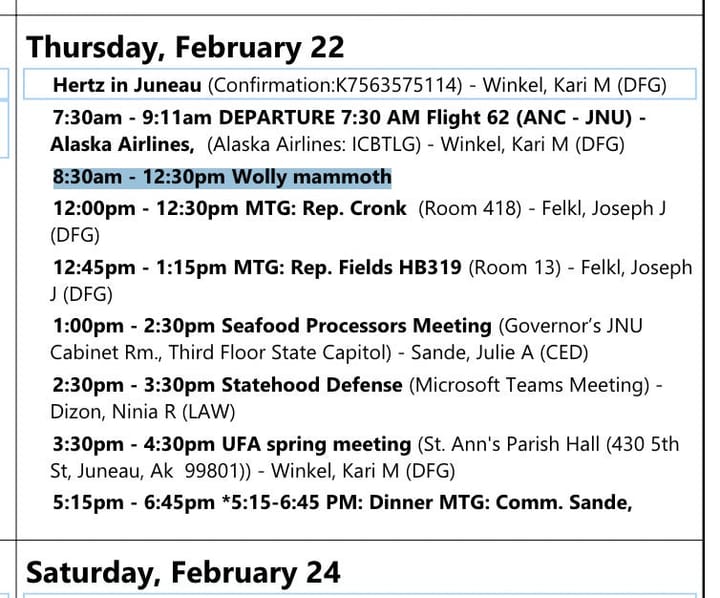Schumacher's win, after two tough years, shows world-class talent is "still in there"
Anchorage cross-country talent Gus Schumacher won an international cross-country ski race Sunday, something no other American man has accomplished in more than 40 years.
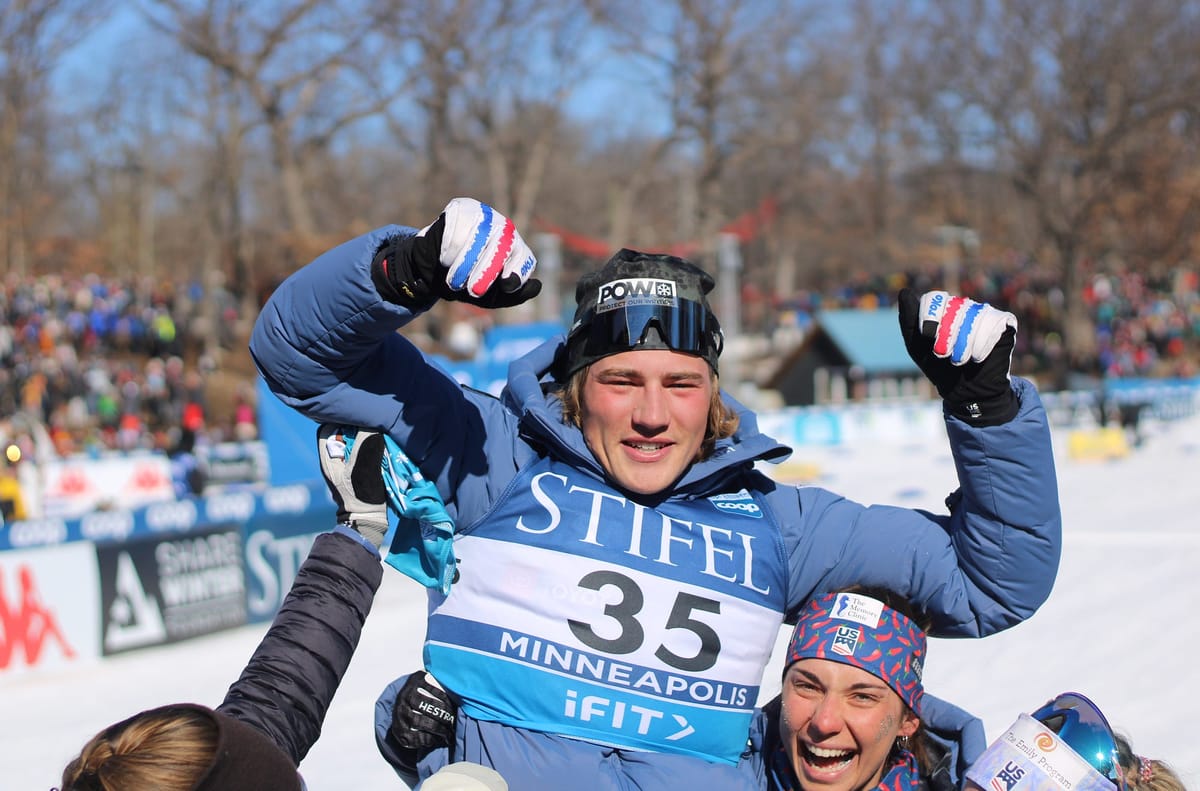
For the past two weeks, I’ve been reporting on cross-country ski racing in Canada and Minneapolis, where the international competition circuit has stopped in. This piece, on Anchorage-raised athlete Gus Schumacher, was first published in FasterSkier, the ski news website that’s supported my coverage of the sport, and it’s republished in Northern Journal with permission.
MINNEAPOLIS — Gus Schumacher, a 23-year-old from Anchorage, accomplished something Sunday that no other American man had done in more than 40 years: He beat every single Norwegian, Swede, Finn and all other comers in an international cross-country skiing distance race.
The result — a star-is-born moment achieved before thousands of screaming fans in Minneapolis — felt almost scripted. Schumacher’s abundant potential has been making headlines since he was 13 years old, back when his coach joked that the teenager weighed less than his dog.
But Schumacher’s route to the top has not been straight. And just below the surface, there’s another strand in the arc of his career that shows why Sunday’s result moved him, and his teammates, to tears.
Just two seasons ago, Schumacher went through a wrenching season and a nightmare Olympic Games in Beijing — where instead of fighting for medals, he was grasping for explanations for why his body was failing him. In one race, he finished nine minutes behind the winner.
Afterward, Schumacher regrouped, adjusted his training and brought in new coaches — producing an abrupt turnaround and a validation that the talent that put him on the cross-country skiing map is still there.
“It was always in my mind that if I did the right things, it’s still in there — it doesn’t go away,” Schumacher told reporters Sunday. He added: “I’ve made some training mistakes, I think, in the last couple of years, but kept loving the sport and wanting to do it. And just kept showing up and kind of figured out what I was doing wrong.”
Schumacher’s result in Minneapolis, on the World Cup circuit’s first stop in the U.S. in two decades, will serve as inspiration to the hundreds of young, aspiring Olympians who lined the city’s trails Sunday. But it also resonated for his teammates — many of whom endure similar ups and downs themselves.
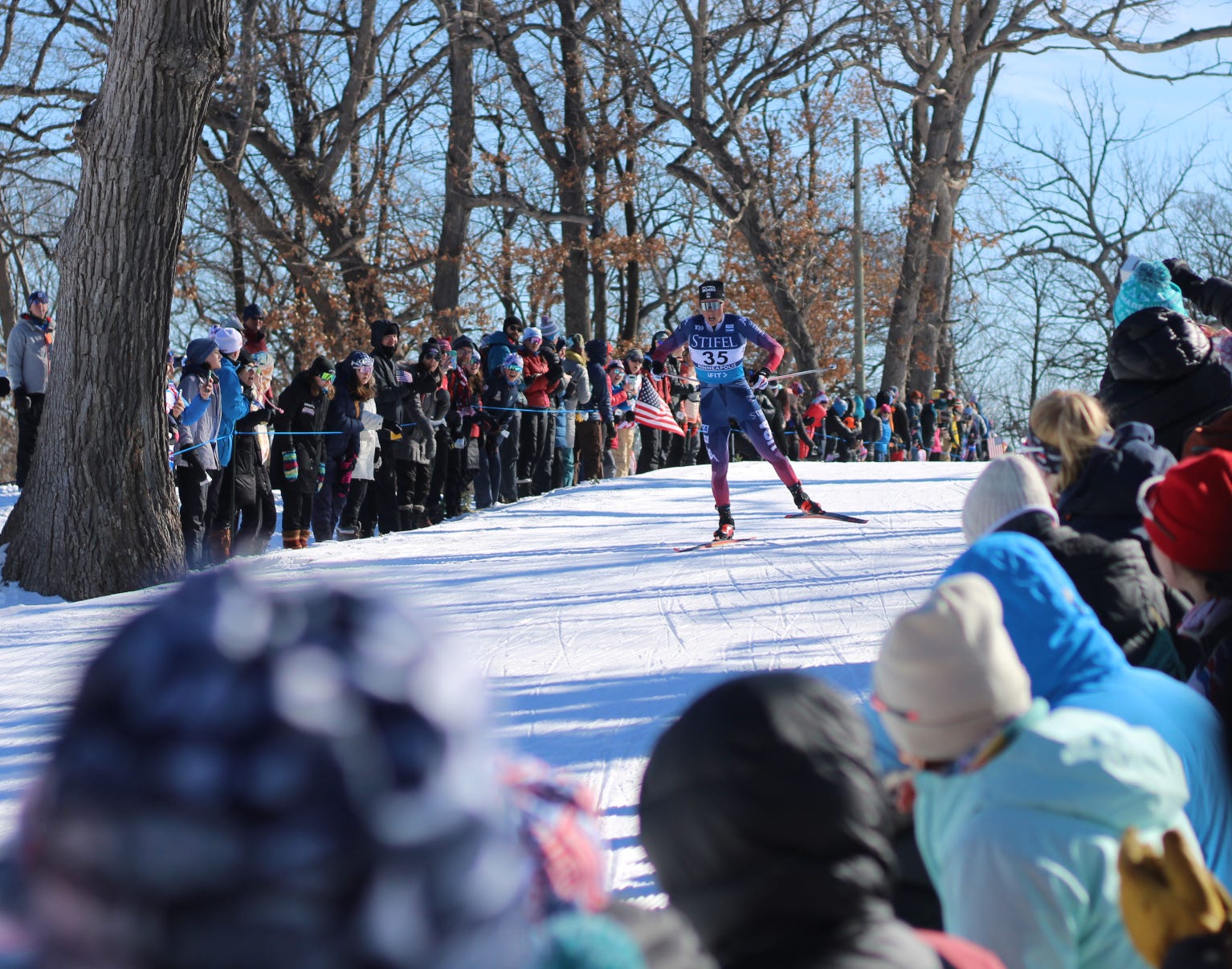
That includes Julia Kern, a 26-year-old American Olympian who said she was trying to channel Schumacher as she warmed up for her own race Sunday, after his win. Kern won a World Championships medal last year, but has been struggling this season.
“Warming up, I was just thinking about how I want to ski like Gus,” Kern said. “It gave me confidence. I’ve had a tough year. And I was thinking back to his Olympic year.”
Schumacher, who grew up training with the Alaska Winter Stars program in Anchorage, first announced himself as a once-in-a-generation talent four years ago. That was when, at the age of 19, he won a gold medal at the World Junior Championships in a 10-kilometer race — the same distance as Sunday’s event.
But after he graduated to the top-level World Cup circuit, Schumacher started struggling with his training formula, and only sporadically translated his big junior performances into good results on the adult circuit. In his toughest moments, like at the 2022 Olympics, he was struggling to understand the “weird” feelings in his body.
“That’s tough, to not feel like myself, and not knowing when it’s going to come back,” he said at the time.
In retrospect, Schumacher and his coaches have made a relatively straightforward diagnosis: He was training, simply, too much. That’s a common mistake for early-career cross-country skiers, since the sport generally rewards hard work and the limits to training can often only be found through trial and error.
Jessie Diggins, 32 — the superstar American skier from Minnesota who owns three Olympic medals — went through a similar process of self-discovery earlier in her career, said Chris Grover, one of the U.S. Ski Team’s lead coaches.
“She just wanted to train, train, train. And at one point, she was getting diminishing returns,” Grover said after Sunday’s race. “Gus is starting to figure that out, starting to figure out his body at this level.”
[Listen to Schumacher discuss his training and racing on a podcast]
Since that tough Olympic year, Schumacher has made some changes. He’s now moved to the Alaska Pacific University training program, which includes several other members of the U.S. World Cup team and a renowned coach, Erik Flora.
He’s also been getting advice from one of the U.S. team’s coaches, Kristen Bourne, who described Schumacher’s experience over the past few years as a natural part of the sport.
“When we’re having those hard times, absolutely, you do learn from them and become better,” she said. “We’re trying to figure out the individual jigsaw puzzle that is each athlete.”
The changes clearly seem to be helping Schumacher, who already notched several eye-catching results earlier this season, including fourth place at a World Cup race last month.
What’s excited his coaches, teammates and boosters is how Schumacher already appears to be absorbing some of the important lessons about training and racing in a career that’s only just starting.
“I’m sure I’ll make some more mistakes,” he said Sunday. “But hopefully less from here on out.”
Schumacher’s perseverance was rewarded with an experience of a lifetime Sunday.
He was an early starter in the race, held in a time trial format that sends athletes on to the course one at a time.
Schumacher had the fastest pace when he crossed the finish line. But he knew that a whole pack of Olympic medalists was behind him, and was likely to better his time.
But as he waited at the finish, with a growing pack of teammates and supporters, none of his rivals could catch him.
“They started finishing, and I was like, ‘Oh my God — I might get a podium,’” Schumacher said.
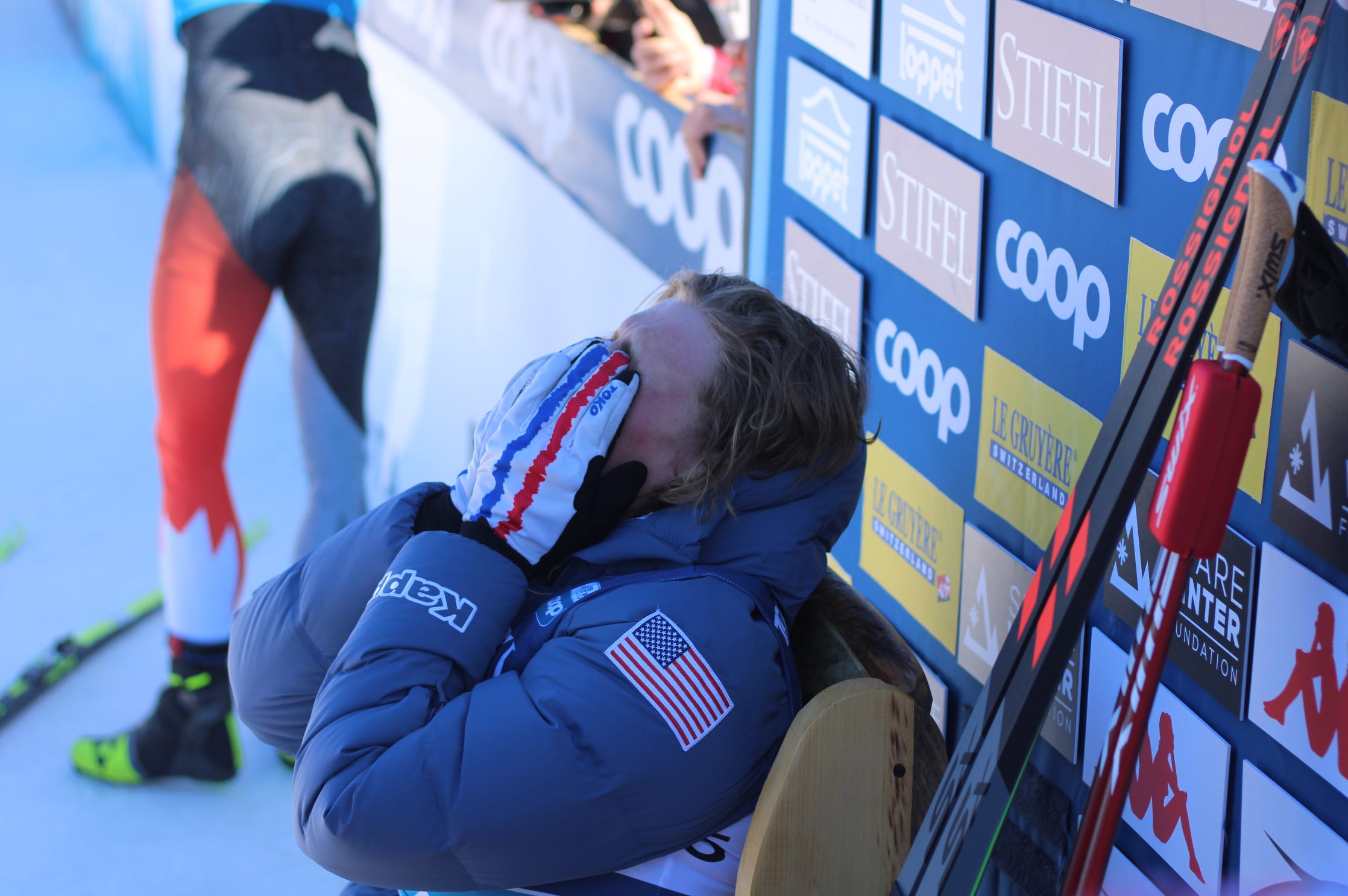
First William Poromaa, a top Swedish talent, crossed the line eight seconds behind Schumacher. Then came Norwegian Harald Ostberg Amundsen, the leader of the overall World Cup standings, four seconds slower, and Johannes Hoesflot Klaebo, another Norwegian, who has five Olympic gold medals to his name: six-and-a-half seconds back.
Teammate Luke Jager, among those gathered with Schumacher in the finish, “was like, ‘You’re going to fucking win this thing.’ And I was just, like, ‘Oh my God. I might actually win this race,’’” Schumacher said. “And then it happened.”
His teammates hoisted him onto their shoulders as the huge crowd that had gathered for the Minneapolis race roared, and later erupted in a chant: “Gus! Gus! Gus!” Afterward, Schumacher posed on the podium with 20 teammates and support staff, then took a celebratory jog, dispensing high fives to fans in the grandstand.
His whole family — father, mother, siblings and girlfriend — was there to watch it happen.
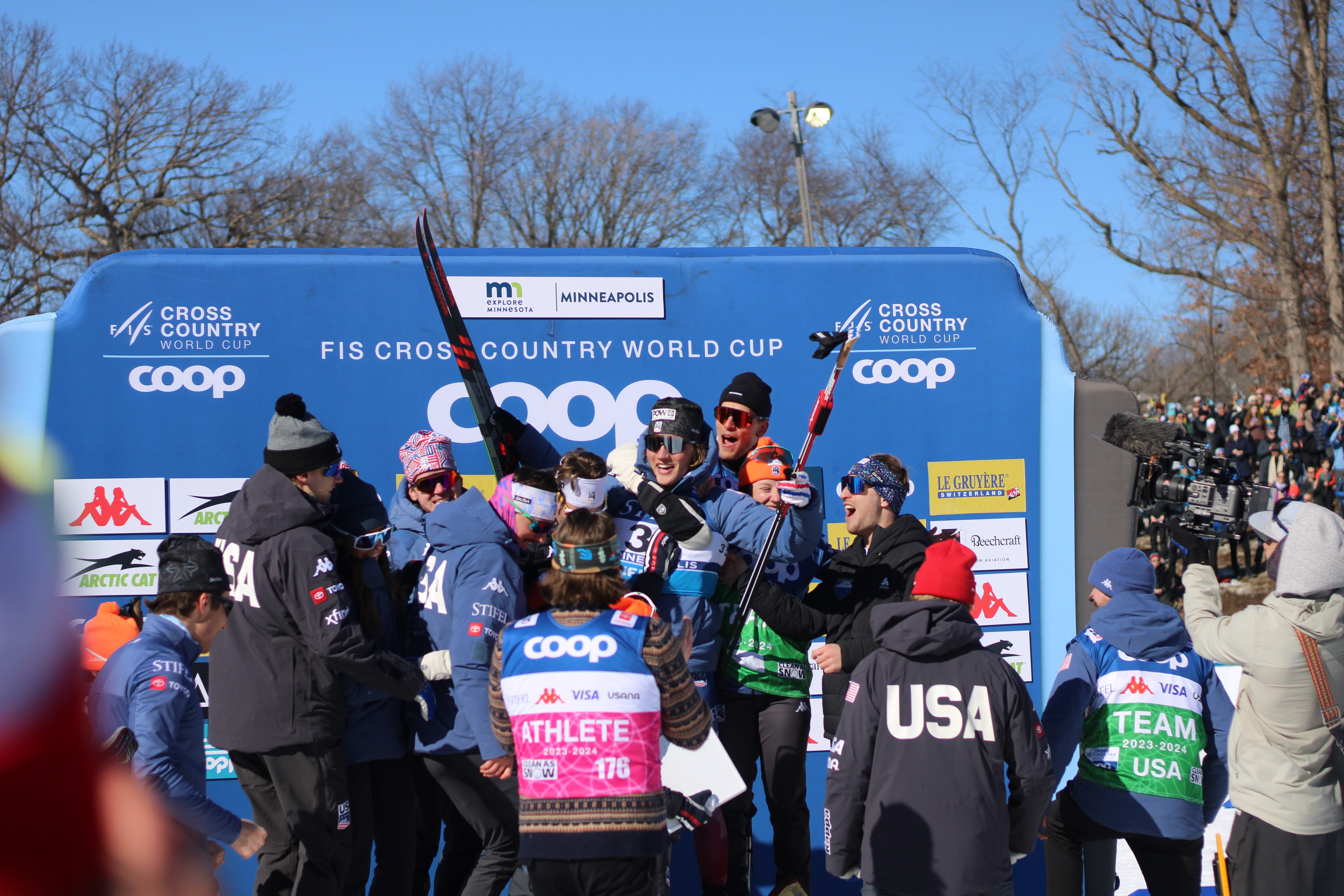
“The happy thing for me is that this has the potential to be a normal length career. And it feels like he’s maybe discovered the secret sauce now,” said Greg Schumacher, his father. “He’s done what he could to get here. And so it’s nice for him to have a day where it worked.”
The electric atmosphere after Schumacher's win Sunday spread even to his competitors — the two Norwegians who shared the podium with Schumacher couldn't hold back their smiles when he climbed up to the top step for an awards ceremony. A star French athlete, Lucas Chanavat, stood in the crowd, filming the scene.
"It was insane. It was so cool. It gave me goosebumps," Chanavat said. "This is cross-country skiing."
Northern Journal is a reader-supported publication. To receive new posts and support my work, consider becoming a free or paid subscriber.



